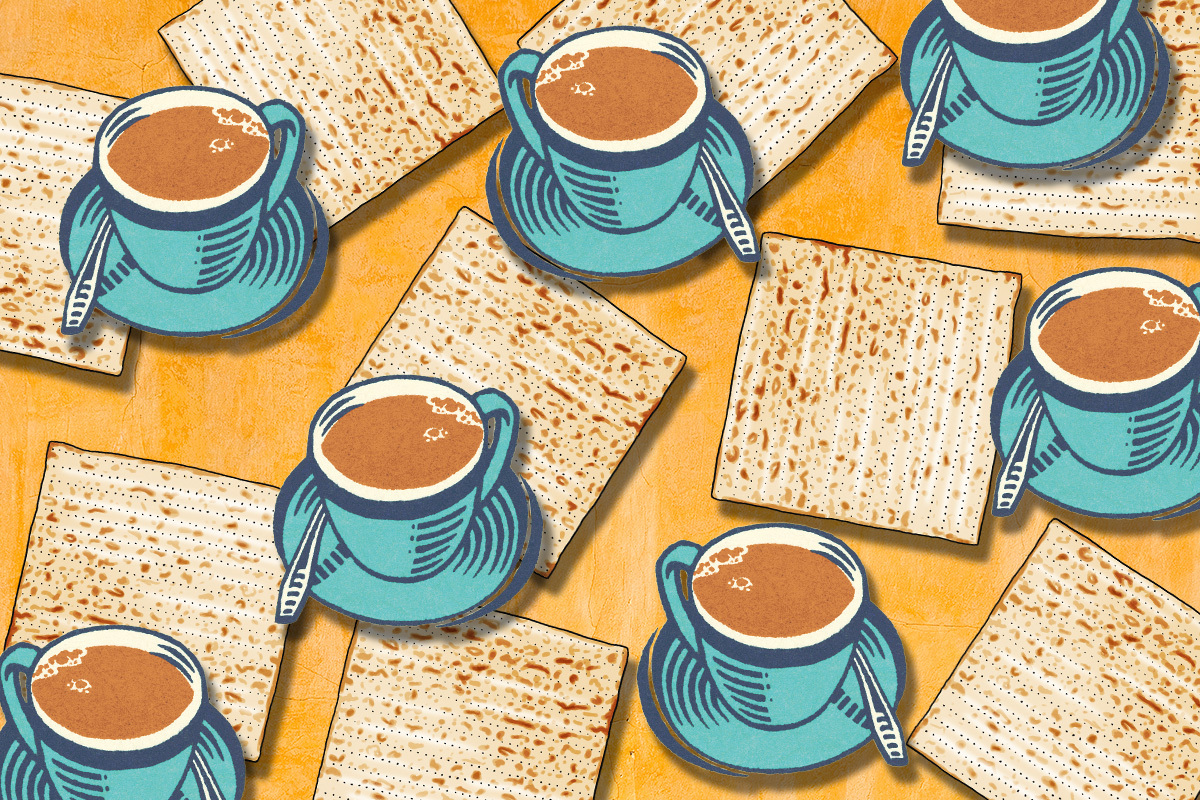“Can we get thick crust?” my daughter Hannah called out to me one day last spring while I was ordering cheese pizza for dinner.
“Absolutely not,” I shouted back. “It’s Passover. Thin crust only.”
We don’t necessarily follow all the usual rules for Passover in our house, but we do have rules. Bread is out, as are rolls, bagels and buns. Thin crust pizza, pancakes and tortillas are all fine because, the way I look at it, they haven’t risen all that much. At the same time, we avoid food that others would say is perfectly fine for Passover, like stews and complicated desserts. The Israelites were in a huge rush running away from the Egyptians. If the bread couldn’t rise, I’m sure there wasn’t enough time to simmer the meat or whisk the egg whites.
Our family’s food traditions, no matter how idiosyncratic, are very important to me, especially at Passover. So I’m still in shock that one day, many years ago, my father gave up his own (very weird) Passover breakfast treat.
Every morning during Passover for as long as I can remember, my dad had breakfast out of the “Linz Cup,” an oversized fine china coffee cup with the name “Bertha Linz” engraved on it in gold lettering. Bertha Linz was my great-great-grandmother. I guess my dad’s generation was too formal to call coffee cups by their first names, but I would have called it “Big Bertha.”
My dad would crumble matzah into small, bite-size pieces and drop them in the Linz Cup, followed by two teaspoons of sugar, whole milk and a cup of steaming hot coffee. It was called, creatively enough, “Matzah Coffee.” As a little kid, I thought it was the grossest thing in the world, but by the time I was 10 or 11, I started eating it too — first to seem older than I was, and then because it became my tradition to do so.
One year when I came home from college for Passover, I saw my dad having a butter and anchovy matzah sandwich at breakfast, which was equal parts disgusting and surprising. “What are you doing, Dad? Where’s the Linz Cup?” I asked, watching his gross sandwich crumble onto his undershirt. He shrugged while taking another bite. “And where’s the Matzah Coffee?” I demanded.
“I don’t eat that anymore. Don’t like it,” he replied.
Wait, what? How’s that a choice? We eat Matzah Coffee for breakfast during Passover; it doesn’t matter if we like it or not. I had been eating that stupid breakfast for nearly a decade by then. Dad couldn’t just suddenly choose not to like it.
“What does mom think about this change?” I wanted to know. Dad shrugged again, just like my mom did when I called her over (although we both agreed his anchovy and butter matzah sandwich was disgusting).
I was not happy at all with this sudden departure from tradition. I was supposed to change when I left home — not him, and definitely not our traditions.
My wife and I have tried over the years to create Passover traditions for our kids to ultimately accept, reject or modify when they have families and homes of their own. Every seder starts with “now in the presence of loved ones and friends” and ends with “next year, may we all be free.” We use the same matzah plate and cloth cover and the same gigantic Elijah’s cup. We lay out the same Passover children’s books that the kids have long outgrown. We use the same recipe for haroset each year, and we make the same salmon and brisket and rosemary roasted potatoes.
Another tradition at our seder is that we always recite the cumulative song “Echad Mi Yodea” (“Who Knows One, I Know One”) in one breath. This is easy for the first few people, who only need to recite a few verses, but gets harder and harder as it approaches the thirteenth verse, leaving the thirteenth person to say all thirteen verses in one breath. (I always hope the thirteenth verse lands on me so I can show off my lung capacity, but it’s also fun when it lands on someone else and I can try to make them laugh before they finish.)
Even though my dad smoked a pipe and cigars most of his life, he could get through all thirteen verses in one breath until his mid-70s. The year he turned 80, he needed to take a breath every one or two verses; a few years after that, he’d stop to catch his breath every few words.
But that was then. My dad died a few months ago, and this will be the first Passover seder without him. I know this seder will be hard on my mom and the rest of us, which is why tradition is so important. We lose those we love, but through the shalshelet hakabbalah, the chain of tradition, their memories stay alive.
This will also be the “last” seder at home for my daughter Hannah before she goes off to college next fall. I’m sure she’ll be back over spring break and summers, but this is a separation I’ve dreaded for a long time. I want her to go, and I don’t want her to go. Two truths, equally alive, fighting for primacy in my heart.
Change happens, whether we want it to or not. Children will grow up and parents will die. But family traditions carry us through. Life moves fast, but traditions slow things down. They provide anticipation, nostalgia and sacred family moments to savor.
I don’t eat Matzah Coffee anymore, but I think it’s time for a new food tradition to honor my dad, gross out my daughter and celebrate the season.
Thin crust anchovy pizza, anyone?








